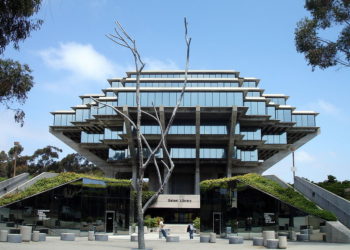Editor’s Note: Today’s post is by Rebecca Bryant, PhD. Rebecca is Senior Program Officer with OCLC. She previously served as Assistant Dean in the University of Illinois Graduate College and Director of Community at ORCID. Her research interests include research information management (RIM), persistent identifiers, and institutional scholarly communication practices.
In our work at libraries, universities, or publishers, we are often consumed by the challenges of technical interoperability between systems. But many of us can also recall projects that, despite technical success, failed because too little effort was spent building relationships and securing buy-in. At conferences, I often hear this referred to as “the social stuff,” or “cultural misalignment;” but what we’re really describing is a failure of social interoperability—the creation and maintenance of working relationships across individuals and organizational units that promote collaboration, communication, and mutual understanding.

Social interoperability can be challenging anywhere, but it seems particularly challenging in US higher education. And it can mean that efforts such as ORCID adoption can take years instead of months, as an array of stakeholders must come together in collective, socially interoperable ways. Or that implementing a campus-wide research information system feels like “herding flaming cats,” in the words of a library friend. For those working adjacent to higher education, including publishers, platform providers, and PID services, this slowness must be hard to fathom.
I’ve found extremely useful the description of universities as “complex adaptive systems” by systems engineering expert and former university leader William B. Rouse. He describes universities as similar in complexity to urban systems, characterized by:
- Nonlinear, dynamic behavior. The behaviors in the university can appear random and chaotic. Individuals in the system may ignore stimuli, remaining oblivious to activities outside of their immediate purview, reacting infrequently, inconsistently, and perhaps overzealously when they do take notice.
- Independent agents. Individuals, and especially faculty, have a lot of freedom to be self-directed: in research, teaching and course development, and behaviors. Their behaviors are not dictated by the university, and in fact, the independent agents may feel free to openly resist institutional initiatives.
- Goals and behaviors that differ or conflict.The interests and needs of the independent agents acting within the university are highly heterogeneous, leading to internal conflicts, professional discourtesy, and sometimes outright competition.
- Intelligent and learning agents. Not only are people independent agents, they’re also smart independent agents, who can learn how the complex university works and adapt their behaviors to achieve their personal goals. With such heterogeneous goals across the enterprise, individuals can end up working at odds with each other.
- Self-organization. While universities have established hierarchies (like colleges, schools, and departments), there can also be self-organized interest groups that arise to meet evolving needs. This can also lead to duplication of effort and services, as a group working to address a problem may be unaware of similar efforts and act independently instead.
- No single point(s) of control. Universities are characterized by a significant degree of decentralization where units, as well as individuals, operate in a federated manner with a high degree of autonomy. As a result, universities are not sites where mandates usually work — they aren’t characterized by a command and control system. Instead, they work through incentives and inhibitions.
Whether you are working within or adjacent to higher education and research, I think that having a better sense of why cross-functional collaboration is hard can improve the likelihood of successful outcomes. It also helps to know more about who the main campus stakeholders are in research support.
A newly published OCLC Research report, Social Interoperability in Research Support: Cross-campus Partnerships and the University Research Enterprise, of which I am a co-author, explores the social and structural norms (and barriers) that shape cross-campus collaboration in research support. With content synthesized from interviews conducted with practitioners from a wide range of campus units, the report describes the network of campus stakeholders involved in both the provision and consumption of research support services.
Understanding this complexity of university systems is essential for successful navigation and collaboration. This is particularly true as we observe the growth in research support services offered by US research universities today. What do I mean by “research support”? Things like ORCID adoption, research data management (RDM) services, researcher expertise discovery tools (research information management or RIM), and research analytics and benchmarking tools for use by researchers and administrators alike — four topics we explore in depth in our report. Research support also includes an array of scholarly communications activities, including citation management and publishing. In short, it embraces a wide array of institutional activities and services spanning the research life cycle that enhance researcher productivity, facilitate analysis of research activity, and/or make research outputs and expertise visible and accessible.
Our report focuses on topics like ORCID adoption and RIM implementation because these efforts require broad support within the institution. No single unit owns or manages these services; research support is an enterprise wide task. Positions are hosted by, funded, and utilized by a number of stakeholders, including the library, research administration, academic affairs, campus IT, faculty affairs, and campus communications.
Social interoperability is a means of cutting through complexities and obstacles, promoting mutual understanding, highlighting coincidence of interest, and cultivating buy-in and consensus. Indeed, our report describes how the development and stewardship of trusted relationships on a decentralized university campus is crucial for successful cross-campus partnerships. But it also takes time — sometimes a lot more time: a faculty information system administrator told us, “It all takes longer and has more dependencies than you think.” Progress can be slowed by the necessity of first securing buy-in across stakeholders on campus. Considerable investments in energy and time are necessary for building and maintaining relationships, but the results are often stronger, and probably longer lasting, than acting solely. For instance, a library administrator told us,
I don’t think that [research data management support and the researcher profiles system] would have been successful as library-only initiatives. . . It’s been absolutely critical that they were backed by the [office of research] because I think that’s also helped keep it to be more of a campus-wide perspective.
As an OCLC Research report, our primary audience is libraries. However, our report is intended for a much broader audience, as a roadmap for acquainting a variety of campus stakeholders with each other. Understanding the growing necessity of enterprise-wide social interoperability in research support is also of interest to publishers and platform providers. And the best practices and advice synthesized from a number of interview informants in key research support areas on how to optimize social interoperability is relevant to all.
I believe the need for increased cross-campus social interoperability will be amplified due to the pandemic and its longer-term effects. The days of individual campus units “going it alone” are numbered — instead, we need to work together across our silos, more than ever before.
We all need to better understand each other if we are going to cooperate.
Author acknowledgements: Thanks to my report co-authors Annette Dortmund and Brian Lavoie as well as Scholarly Kitchen Chef Lettie Conrad who provided suggestions that improved this blog post. This post is an expanded version of an article that appeared on the OCLC Research blog entitled, “Why is intra-campus collaboration so hard?!”
Discussion
1 Thought on "Guest Post — Research Support is an Enterprise Activity"
I love your definition of ‘social interoperability’, Rebecca. It nicely explains many of the key reasons why new technology can be so difficult to implement across complex organizations. A lot of challenges I see in upgrading technology-driven solutions within larger publishers and their institutional customers fall into this area. Thanks for sharing.



